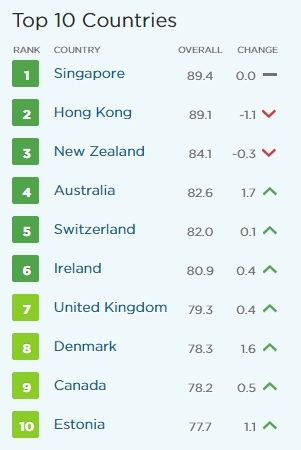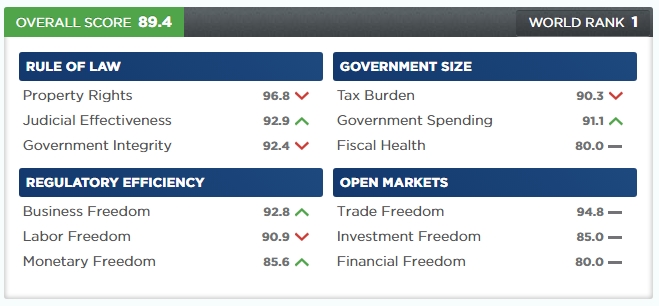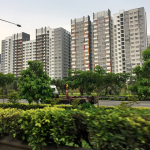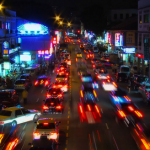Singapore tops as the world’s most free economy for the first time in 2020 Index of Economic Freedom
Singapore took the top spot as the world’s most free economy for the first time in the 26-year history of The Heritage Foundation’s 2020 “Index of Economic Freedom.” The 2020 Index of Economic Freedom finds a world economy that is “moderately free,” with economic liberty on the rise in every region, including among formerly socialist economies which have embraced capitalism and free markets, such as Estonia, Lithuania and Georgia.
The world average freedom score of 61.6 is the highest recorded in the 26-year history of the Index, and more than three points higher than that recorded in the first edition of the Index in 1995.
The world’s least economically free nation remains North Korea, followed closely by the failed socialist nations of Venezuela and Cuba.
“This year’s Index highlights a consistent trend we are seeing around the globe – countries which embrace the ideals of capitalism and free markets see higher growth, rising standards of living, decreased poverty and more economic opportunities across the board. Meanwhile, those that embrace socialism, protectionism and other failed big-government economic approaches continue to fall behind, and ultimately deny their people the chance for better lives,” say 2020 Index of Economic Freedom editors Amb. Terry Miller, Anthony Kim and James Roberts.
The coronavirus outbreak, originating in China’s Hubei province and spreading to other parts of the world in recent weeks, has produced negative economic headlines, but does not presently pose a threat to the trend growing global economic freedom, the editors say.
“The world is watching how countries across the economic freedom spectrum respond to the coronavirus pandemic. The Index of Economic Freedom’s findings shed light on the policy responses that have brought about more prosperous economies, better health care, an abundance of food and clean water, and a higher quality of life. If the Index teaches us anything, it’s that responses to the pandemic should be targeted and temporary and not exploit the crisis to pursue pet policy priorities that needlessly expand the power of government,” they state.
Per capita incomes are much higher in nations that are more economically free. Economies rated “free” or “mostly free” in the 2020 Index of Economic Freedom enjoy incomes more than twice the average levels in all other countries, and more than five times higher than the per capita gross domestic product (GDP) of “repressed” economies.”
Among the 180 countries ranked, scores improved for 124 countries and declined in only 50, with six remaining unchanged.
Six economies earned the Index’s designation as “free” (scores of 80 or above), while the next 93 are classified as “mostly free” (70-79.9) or “moderately free” (60-69.9).
“Thus, a total of 99 economies, or 55 percent of all nations and territories graded in the 2020 Index, provide institutional environments in which individuals and private enterprises benefit from at least a moderate degree of economic freedom in the pursuit of greater economic development and prosperity,” the editors write.
The United States recorded a score of 76.6, slightly lower than its 2019 score, which the editors attribute to “reckless and ongoing deficit spending by Congress and the Executive under both parties.” Ranked No. 17 globally, the U.S. remains “mostly free” and its regional ranking is unchanged at 3rd out of 32 countries that were graded in the Americas region, behind Canada and Chile.
Hong Kong and Singapore traded places in the 2020 Index of Economic Freedom for the first time in its 26-year history, primarily due to a decline in the investment freedom score for Hong Kong. Seven of the top 10 finishers—Australia (4th), Switzerland (5th), Ireland (6th), the United Kingdom (7th), Denmark (8th), Canada (9th), and Estonia (10th)—recorded score increases this year.
The most improved countries in the 2020 Index of Economic Freedom include Equatorial Guinea, Djibouti, Ecuador, Vanuatu, Kazakhstan, Uzbekistan, The Gambia, Madagascar, Azerbaijan, Belarus, and Togo.
Table of Contents
The Most Free
- Singapore
- Hong Kong
- New Zealand
- Australia
- Switzerland
- Ireland
- United Kingdom
- Denmark
- Canada
- Estonia
The Least Free
- North Korea
- Venezuela
- Cuba
- Eritrea
- Rep. Of Congo
- Bolivia
- Zimbabwe
- Sudan
- Kiribati
- Timor-Leste
Launched in 1995, the Index evaluates countries in four broad policy areas that affect economic freedom: rule of law; government size; regulatory efficiency; and open markets. There are 12 specific categories: property rights, judicial effectiveness, government integrity, tax burden, government spending, fiscal health, business freedom, labor freedom, monetary freedom, trade freedom, investment freedom, and financial freedom. Scores in these categories are averaged to create an overall economic freedom score.
Singapore’s economic freedom score is 89.4, making it the world’s freest economy in the 2020 Index of Economic Freedom.
Its overall score is unchanged from 2019, with a small improvement in the business freedom score offset by a small decline in the government integrity score. Singapore is ranked 1st among 42 countries in the Asia–Pacific region, and its overall score is well above the regional and world averages.
Singapore has ranked among the freest economies in the world over the life of the Index but gains the top spot this year for the first time. Its sustained extraordinary performance has resulted in one of the world’s highest per capita incomes and solid rates of GDP growth.
Singapore is the only country in the world that is considered economically free in every Index category. Ongoing restrictions on civil liberties, while not directly affecting the country’s score, may have an indirect impact on economic freedom and remain a concern.
Singapore is consistently ranked as one of the world’s most business-friendly countries. In 2019, the government introduced measures to decrease the ratio of foreign workers to local employees, threatening labor supply in the services sector.
Property rights are recognized and enforced effectively. Judicial processes are procedurally competent, fair, and reliable, and the judiciary is regarded as independent, although the government does have an overwhelmingly successful record in court cases.








